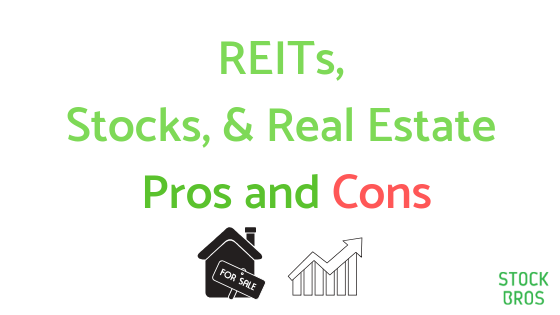|
These are 3 methods that investors use to include different types of assets in their portfolio: REITs, stocks and real estate investing. So, which one should you settle for? This article will examine each one, along with their advantages and drawbacks, after which you can come to a conclusion. REITs (Real Estate Investment Trusts)
A REIT portfolio may include properties such as hotels, warehouses, apartment complexes, office buildings, infrastructure, and many others. Investing in REITs can be done through a brokerage account in the same manner you would buy a stock or ETF, as they trade like stocks.
In spite of this, the main reason why people are investing in stocks in the first place is that they want to earn some return. The return will either come when a stock pays dividends, or when the price goes up and you can sell the stock for a convenient price if you wish to. Companies are engaging in selling stock shares in order to gain money. The money they raise can be used for investing in the business’s growth, a new product line, or for repaying debt. It’s essential to know that stocks are typically offered through IPO or initial public offering. Therefore, when you purchase a stock, it will be bought from another investor that sells it and not from the actual company.
In other words, real estate investing is classified as the purchase, ownership, management, sale or lease of a property. The main purpose of doing this is for earning money.
Comparing Their Long-Term Performance Here’s a quote from investopedia.com that sums up their respective performance in one paragraph: “Average annual returns in long-term real estate investing vary by the area of concentration in the sector. Average 20-year returns in the commercial real estate slightly outperform the S&P 500 Index, running at around 9.5%. Residential and diversified real estate investments do a bit better, averaging 10.6%. Real estate investment trusts (REITS) perform best, with an average annual return of 11.8%.” (https://www.investopedia.com/ask/answers/060415/what-average-annual-return-typical-long-term-investment-real-estate-sector.asp) Below you will see a 20 year chart of the performance of REITs compared to the S&P 500. As we mentioned before, REITs can be more volatile. The top in 2006 for the REIT index to the bottom in 2009 represented a roughly 70% drop. However, the gains were recovered rather quickly. Investing in real estate or REITs after a market crash is definitely a good idea.
Final Thoughts You decide which option is worth investing in. As you can see, all three alternatives – respectively stocks, REITs and real estate – have their own pros and cons. All of these have lengthy, proven track records in terms of return on investment over the long-term. In the short-term, anything can happen and it is best to do your research before buying.
Comments
|
Categories
All
Archives
September 2022
|



 RSS Feed
RSS Feed